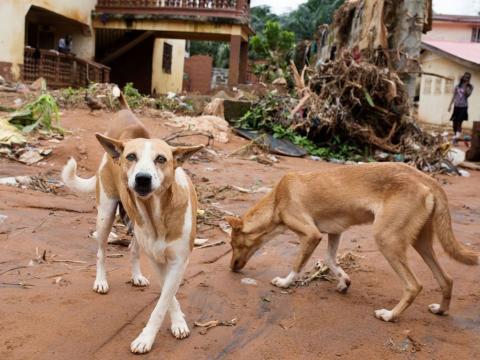By Oumar Farouk Sesay
The rate at which dogs are deliberately killed, maimed and left to lurch in pain from dustbin to dust or left to rot in the street of Freetown, speaks of more profound psychological trauma that interrogates our compassion and sensibilities as a nation.
Compassion, the human form of grace which facilitates our love for animals, could enhance connectivity between one person and another irrespective of colour, race and creed. What seems to be the trend these days is for a motorist to recklessly kill a dog and leave the carcass to rot in the street.
Children and elders maim dogs in a manner reminiscent of the poets retort "like flies to wanton boys are we to the gods they kill us for their sport". It seems we are now using dogs as a training ground to test the residual cruelty of our war years. It seems our way of keeping the consuming flame of yesteryears is to anchor it on our pets as if to perfect it before we unleash it again at each other in an orgy of destruction.
Everywhere dogs are perceived as man’s best friend they guide and protect life and property; abysmal treatment of dogs speaks of a deep-seated trauma that could accelerate the haemorrhaging of the national soul.
Islamic literature has a lot of anecdotal narratives that tend to disadvantage dogs in preference to cats. It seems the lazy cat cuddly public relation strategy has given it access to Muslim homes, leaving dogs to suffer the wrath of fanatics who perceive them as hounds of hell. Although there is preaching against cruelty to animal, most unenlightened fanatics manifest their faith by violating the rights of dogs to be just dogs alongside human beings. The brutality is not limited to only a few people. In fact, it has generality about it that makes observers ponder about our social values.
Dogs were a significant beneficiary of the adage “it takes a village to bring up a dog”. Dogs were the responsibility of everyone in the village. The villages became towns and towns became cities, and the dogs strayed away from their communities and became unknown dogs and named as Okuru Dog; hence their immunity is taken.
Then the rabies awareness campaign got louder and the stray dog received death instead of the proverbial shoo. The desire to rid the society of rabies-infected dogs was a priority; in fact, one of the famous – perhaps infamous – executioners of dogs navigated his way from dog gallows to become a President.
It seems you could kill dogs and nothing wrong will come out of it, but when you kill ducks something ill or evil will come to you. In societies where conservation of flora and fauna in most cases is predicated on myths; sometimes, survival depends on being protected by myths. To be left out of the privilege of myths which ducks and some forbidden forests enjoyed in some cultures, could spell disaster for pets like dogs.
’They are just dogs’ – your refrain whiles reading this article. My response - 'yes they are dogs, but our story is in their narrative’ to kill a dog senselessly is tragic. To leave the carcass to decompose on our streets till it is ground to nothingness by motorists speaks more to our lack of sensibilities, sanitation and sanity.
A person who places value on other creatures could invariably cultivate respect for all forms of lives. Compassion for animals is a training ground for human empathy, and compassion is the unseen force that connects humanity everywhere.
We are only human when we are compassionate. In the absence of compassion human beings are less humane as in the case of slavery and the holocaust.
Compassion is a social emotion that dates back to the evolution of man and spans many religions and disciplines. As argued by leading scholars in the field, compassion is critical in the creation of a sustainable society; it is the substructure for the building of human culture.
Compassion is preached in all major religions; it fuels our literature and art, thereby creating a body of knowledge premised on understanding. Compassionate feelings are fossilized in words and phrases of several human languages and even in gestures that predate language – testimony to the fact that it is a social emotion as old as humanity.
The suffering of animals and people accentuates our mortality and underlines our vulnerability. We most times see ourselves in their plight; we open our hearts to embrace them and their suffering; we co-suffer with them; their pain becomes our pain through a process of painful imagination – moral imagination.
In being compassionate, neurological and physiological activities within us heal us. Every time one of us is suffering, a part of us suffers with them. Every tragedy becomes our tragedy as if we are wired to each other by unseen nerves – a kind of activated Bluetooth sending signals to every human soul who has a cognitive capacity app downloaded within them.
Arguably the training ground for compassion is in the treatment of our domestic animals, deductively our seeming lack of kindness could be traced to our treatment of animals.
Beyond these visible symbols of compassion lies a vast difference that arches back to our culture, religion and belief systems. Our perception of the world around us is influenced by our history, culture, religion, politics, and personal preferences; hence our cognition of the suffering of others is as skewed as the contours of our lives. Could the perpetuation of our prejudices for the otherness of others which fuels conflict, be found in those lame dogs and dead dogs in our street?
Our story in their story perhaps it is not about lame dogs and dead dogs; it is about us. But what do I know about dogs to interrogate your humanity in the era of coronavirus?
Copyright (c) 2020 Politico Online








